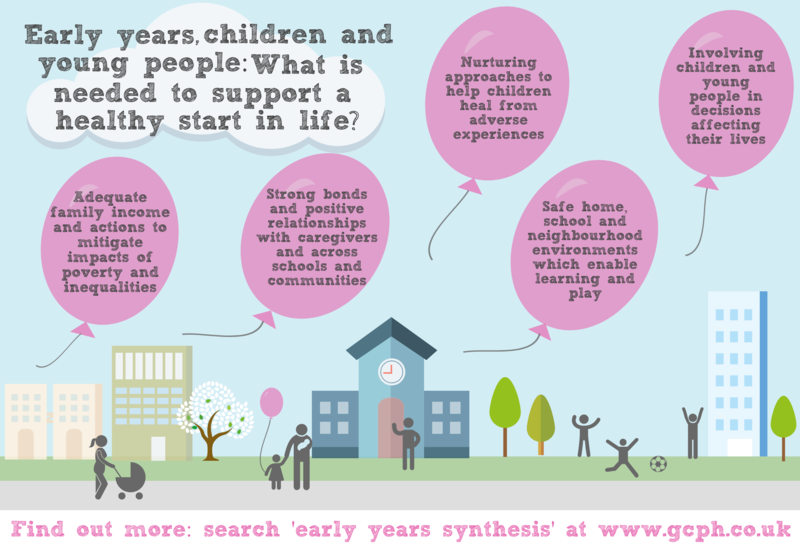Health and early years, children and young people: a GCPH synthesis
This report provides a synthesis of our learning about what factors influence the health of babies, children and young people and how improving circumstances during this life stage can help improve health and tackle health inequalities.
 This synthesis draws on ten plus years of outputs and events from the GCPH and GoWell to outline compelling evidence about the importance of early years’ and childhood experiences for healthy development and for health and wellbeing throughout the life course. The report outlines evidence about the different ‘spheres’ of influence impacting on children’s health and wellbeing:
This synthesis draws on ten plus years of outputs and events from the GCPH and GoWell to outline compelling evidence about the importance of early years’ and childhood experiences for healthy development and for health and wellbeing throughout the life course. The report outlines evidence about the different ‘spheres’ of influence impacting on children’s health and wellbeing:
- Family and parent environment – Fundamental to healthy child development and attachment is the family/household environment, the health and wellbeing of the child’s parents (or main carers) and crucially, consistent love and care.
- Learning environment – Early years settings and schools exert critical influences on children’s development and future outcomes.
- Neighbourhood environment – The neighbourhoods in which children and young people live and socialise have significant impacts on their day-to-day lives and their health and wellbeing.
- Socioeconomic context – The health and wellbeing of children is directly influenced by material circumstances. Socioeconomic factors interact with and impact across children’s family, learning and neighbourhood environments.
This review of early years, children and young people evidence follows on from the synthesis of 10 years of GCPH evidence published in October 2014 which emphasised, in line with international evidence, the importance of economic, environmental and social factors on health. In particular, the GCPH evidence base emphasised the role of four key areas: the economy, employment and poverty; early life experience; neighbourhood environments; and social contexts.
Interacting with all of these, and having their own effect, are the services, interventions and approaches undertaken to improve outcomes for individuals and communities. This review increases understanding of how the whole of society, as well as effective universal services and targeted interventions, can support and nurture all children during this critical life stage. A number of consistent and important themes emerge from the evidence:
- Emotional attachment - Strong bonds and positive relationships within families, in schools and in neighbourhoods are crucial to children’s healthy development and underpin their future development of good relationships and good parenting.
- Safety - Not feeling safe at home can have damaging long-lasting impacts for children into adulthood; levels of safety and cohesion in schools impact on health and wellbeing; and use and enjoyment of neighbourhoods is affected by experiences and perceptions of safety.
- Healing approaches - A lack of attachment and stressful experiences impact negatively on physical and emotional development, with potentially life-long consequences. However, there is also significant capacity for healing through changing circumstances, nurturing approaches, and supporting resilience through family support, schools, communities and services.
- Understanding different circumstances - There is a need for approaches and service delivery to understand and respond to differences in personal circumstances. In particular, to prevent and mitigate against the impacts of poverty and inequalities.
- Involvement in decision-making - Children and young people need to be involved in decisions affecting their lives within their family environments, schools and neighbourhoods. Meaningful involvement is required which influences outcomes.
Health and Early Years web
pdf | 1.76MB
Back to